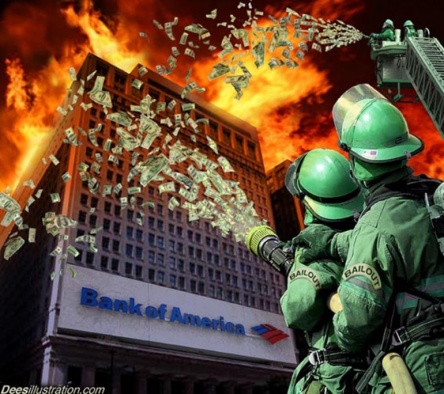Difference between revisions of "Bailout"
m |
(Global Financial Crisis of 2008) |
||
| Line 17: | Line 17: | ||
=="Too big to fail"== | =="Too big to fail"== | ||
One phrase which crops up is that [[bank]]s are "too big to fail", which might suggest that they were too big. Bailouts however are effectively a huge transfer of wealth ''from'' taxpayers ''to'' those invested in the banks, a policy which ''increases'' the wealth of those banks, which increase wealth inequality. Bailouts are faits accomplis, not subject to even a nominal democratic control or performance review. In this sense they were prefigured by another massive financial fraud, the US [[Savings and loan fraud|Savings and loan]] debacle of the [[1980s]]. | One phrase which crops up is that [[bank]]s are "too big to fail", which might suggest that they were too big. Bailouts however are effectively a huge transfer of wealth ''from'' taxpayers ''to'' those invested in the banks, a policy which ''increases'' the wealth of those banks, which increase wealth inequality. Bailouts are faits accomplis, not subject to even a nominal democratic control or performance review. In this sense they were prefigured by another massive financial fraud, the US [[Savings and loan fraud|Savings and loan]] debacle of the [[1980s]]. | ||
| + | |||
| + | ==Global Financial Crisis of 2008== | ||
| + | {{FA|Global Financial Crisis}} | ||
| + | The financial crisis that arose in 2007/08 ended with enormous "bailouts" of "systemically important banks". | ||
| + | |||
{{SMWDocs}} | {{SMWDocs}} | ||
| + | ==References== | ||
| + | {{reflist}} | ||
Revision as of 14:58, 18 May 2021
(financial fraud) | |
|---|---|
 Credit The Dees Illustration Studio | |
| Interest of | George W. Bush |
| A globally organised shift of money from ordinary taxpayers to the already hyper-rich who control the banking and political systems. | |
Bank "Bailouts" involve inflating the money supply by creating money ex nihilo (which means enslaving future generations, who have to pay back these credits through tax payments) and giving it to commercial banks, sometimes with a few token strings attached. The practice is increasingly common in the 21st century, and appears to be globally organised (presumably at the BIS), although his matter is not publicly acknowledged.
Contents
Official narrative
The Official narrative about bailouts is confused and not regularly discussed by commercially-controlled media. When discussing "economic crises", attention is focused on people who lose money (the majority) rather than the tiny minority who gain it. The situation with bailouts is similarly obscure - the story is typically couched with misleading metaphors of existential urgency (e.g. "keeping the economy afloat" etc.) as if banks provide life support to the people. Close discussion about who exactly who decided to bailout which banks to what extent does not figure.
"Too big to fail"
One phrase which crops up is that banks are "too big to fail", which might suggest that they were too big. Bailouts however are effectively a huge transfer of wealth from taxpayers to those invested in the banks, a policy which increases the wealth of those banks, which increase wealth inequality. Bailouts are faits accomplis, not subject to even a nominal democratic control or performance review. In this sense they were prefigured by another massive financial fraud, the US Savings and loan debacle of the 1980s.
Global Financial Crisis of 2008
- Full article: Global Financial Crisis
- Full article: Global Financial Crisis
The financial crisis that arose in 2007/08 ended with enormous "bailouts" of "systemically important banks".
An example
| Page name | Description |
|---|---|
| 2008 Financial Crisis | "an evisceration of some banks by others...a cannibalistic binge billed to the tax-payer"<a href="#cite_note-1">[1]</a> |
Related Document
| Title | Type | Publication date | Author(s) | Description |
|---|---|---|---|---|
| Document:War Martial Law and the Economic Crisis | book extract | 1 November 2010 | Peter Dale Scott |